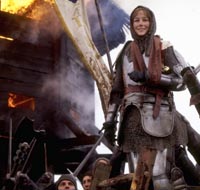
She really liked bells. We may not know the color of her eyes or hair, how much she weighed, how tall she stood, how often she smiled, if at all, or whether she ever suffered, as some moderns have suspected, from anorexia or maybe even “androgen-insensitivity syndrome.” But the Maid of Orleans is on record as having told the accusers at her trial and the friars who took her confession in 1431 that church bells at Vespers and Angelus, at Matins or Compline, triggered her voices and visions. From childhood on among the peasants and the sheep of Domremy, the teenager who was burned at the stake by the Inquisition – because she was absolutely positive that she heard Saint Catherine and Saint Margaret and saw the warrior angel Michael, and who recklessly insisted, even in her prison cell, on dressing as a man – had been enraptured by carillons.
Joan of Arc (Sunday and Tuesday, May 16 and 18; 9 to 11 p.m.; CBS) is big on swords but skimpy on bells. It is infatuated with medieval castles, of which there are many in the Czech Republic, where it was shot, but tone-deaf to the contrapuntal soundtrack of the superstitious times, in which witchcraft and heresy were obsessions, virginity a big deal and transvestism subversive, and church and state duked it out to establish the authority to certify kingship. It is attentive to the transcripts of her trials and posthumous rehabilitation hearing, but peculiarly determined to blame almost everything bad that happened to her on the faithlessness of Charles VII, the king she pretty much crowned with her own symbolic valor.
I’m not saying that the mini-series script, by Ronald Parker and Michael Miller, is any more wrongheaded than the play by Maxwell Anderson that inspired Victor Fleming’s 1948 film with Ingrid Bergman; or the play by George Bernard Shaw that inspired Otto Preminger’s 1957 film with a hapless Jean Seberg; or Voltaire’s La Pucelle d’Orleans, in which she was laughed at; or Shakespeare’s Henry VI, in which she was set upon by demons; or Schiller’s Weimar tragedy, in which she fell in love with an English soldier; or Martha Graham’s ballet, in which she made erotic love to the fire; or any of the Joans to be found in poems by Southey, Lamartine, and René Char, in biographies by Michelet, Anatole France, and Vita Sackville-West, and in the fantasies of, say, Charles De Gaulle. As Marina Warner has observed in Joan of Arc: The Image of Female Heroism, she is unique among historical personalities as the only universal female figure who wasn’t “a queen, nor a courtesan, nor a beauty, nor a mother, nor an artist” – not even, till 1920, a saint. Neither a wife, a mother, a mistress, nor a muse, “she belongs to the sphere of action.” Like Cleopatra, like Hypatia, she’s been rewritten down through the five centuries according to what men think they need: Amazon, Christian mystic, La Belle France, right-wing anti-Semitic patriot, child victim of the cult of innocence, sexual hysteric, etc.
Still, there is no historical evidence whatsoever that Charles set her up to fail at Paris, although CBS seems to insist Tuesday night that neither her own careless arrogance nor any voice or vision in her head could possibly have led her astray; it had to be ungrateful co-conspirators. Nor is there any evidence that, like Jesus, she had been forewarned of her betrayal into the hands of the vengeful English and Burgundians, abetted by the territorial church, but went anyway to Compiegne. Still less is there anything in the record to indicate that, at the direction of Brother John Le Maistre (Maximilian Schell), she was ordered to be raped. This is not a brief for the Inquisition; if there’s a hell, they should all of them rot in it forever. But rape as a policy was not among their repertoire of tortures. When Peter O’Toole’s Bishop Cauchon buries an anguished face in palsied hands, it ought to be his own behavior he is worried about, and his own soul, not what a guard did because a mini-series needed some sexual violence to up the dreadful ante. And they also might have mentioned somewhere in these four hours that in the immediate aftermath of her burning, Joan’s brothers sought to capitalize on her popularity by floating a fraudulent substitute.
As Joan, 16-year-old Leelee Sobieski’s no Jean Seberg. She more resembles the Helen Hunt who played Kathleen Turner’s daughter in Peggy Sue Got Married. There is about her self-absorption something persuasively spiritual as well as adolescent-sulky. She’s got an indignant pout that serves her well during interrogation, if rather less so earlier on, when she must plunge into battle on the usual white horse, looking a little too much like Laurie of Lorraine playing Lawrence of Arabia. Oh, my, how O’Toole suffers, the very embodiment of second thoughts, bad faith, and the corruptions of worldly power. As Joan’s mother, Jacqueline Bisset is far too gorgeous to belong for long in a peasant village instead of a Renaissance painting; and, like Leelee, she must have had the best dentist in the fifteenth century. Powers Boothe is one of those fathers who think the only voice any daughter ought to hear is their own. Neil Patrick Harris is in danger of growing up from Doogie Howser to either Malcolm McDowell or Roddy McDowall; his epicene Charles oddly chimes with Leelee’s pubescence. Peter Strauss, part mercenary and part chevalier, is a little late with the cavalry. Shirley MacLaine’s cameo as Madame de Beaurevoir proves that she can hold her own with Judi Dench.
Although my preview cassette arrived in rough cut, with a few of the special effects yet to come, there’s no reason to think the finished product won’t be impressive. But by downplaying just how many borders she transgressed, this Joan of Arc ends up muddling the deeper reasons why our daughters love her more than Robin Hood.